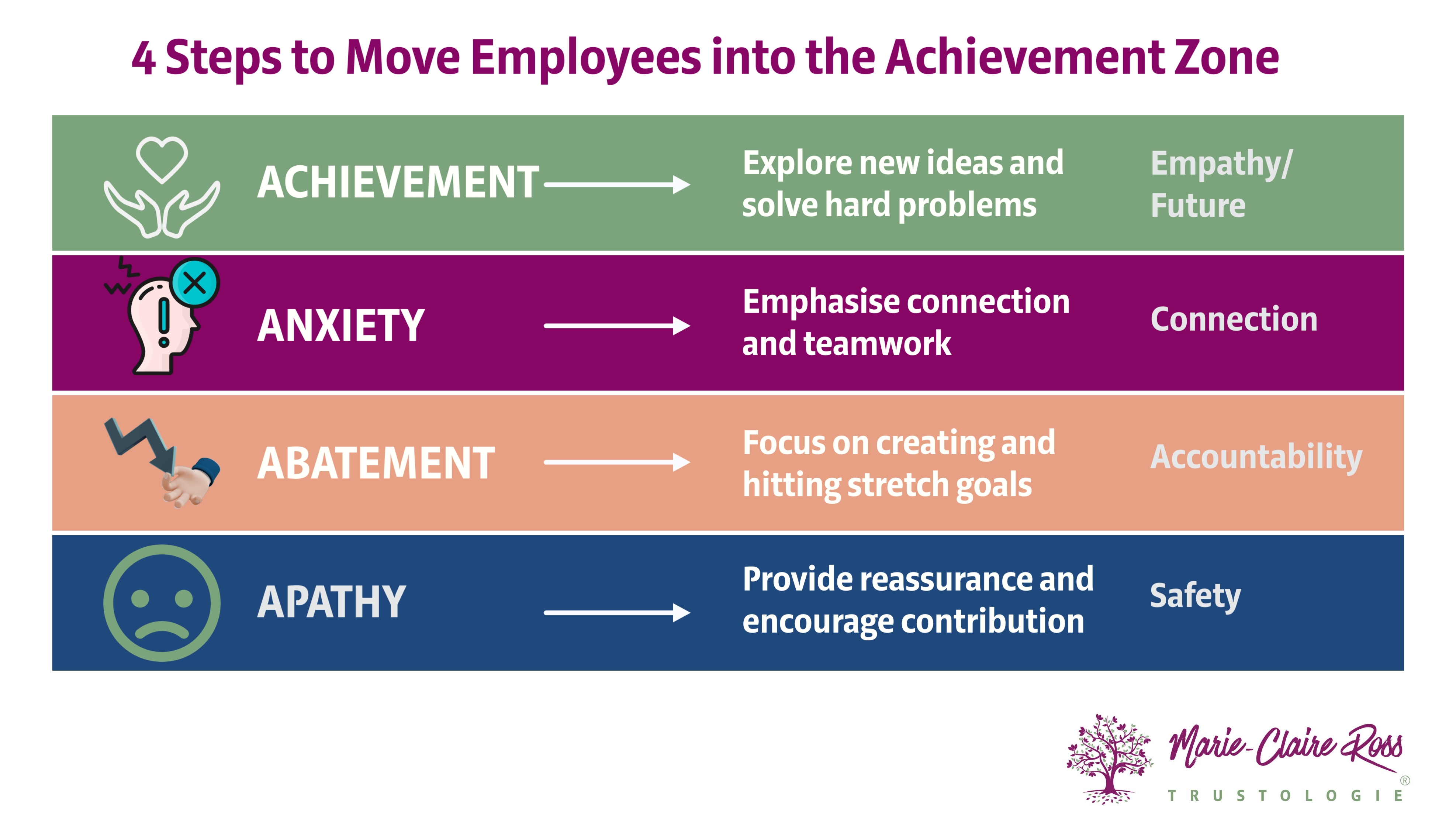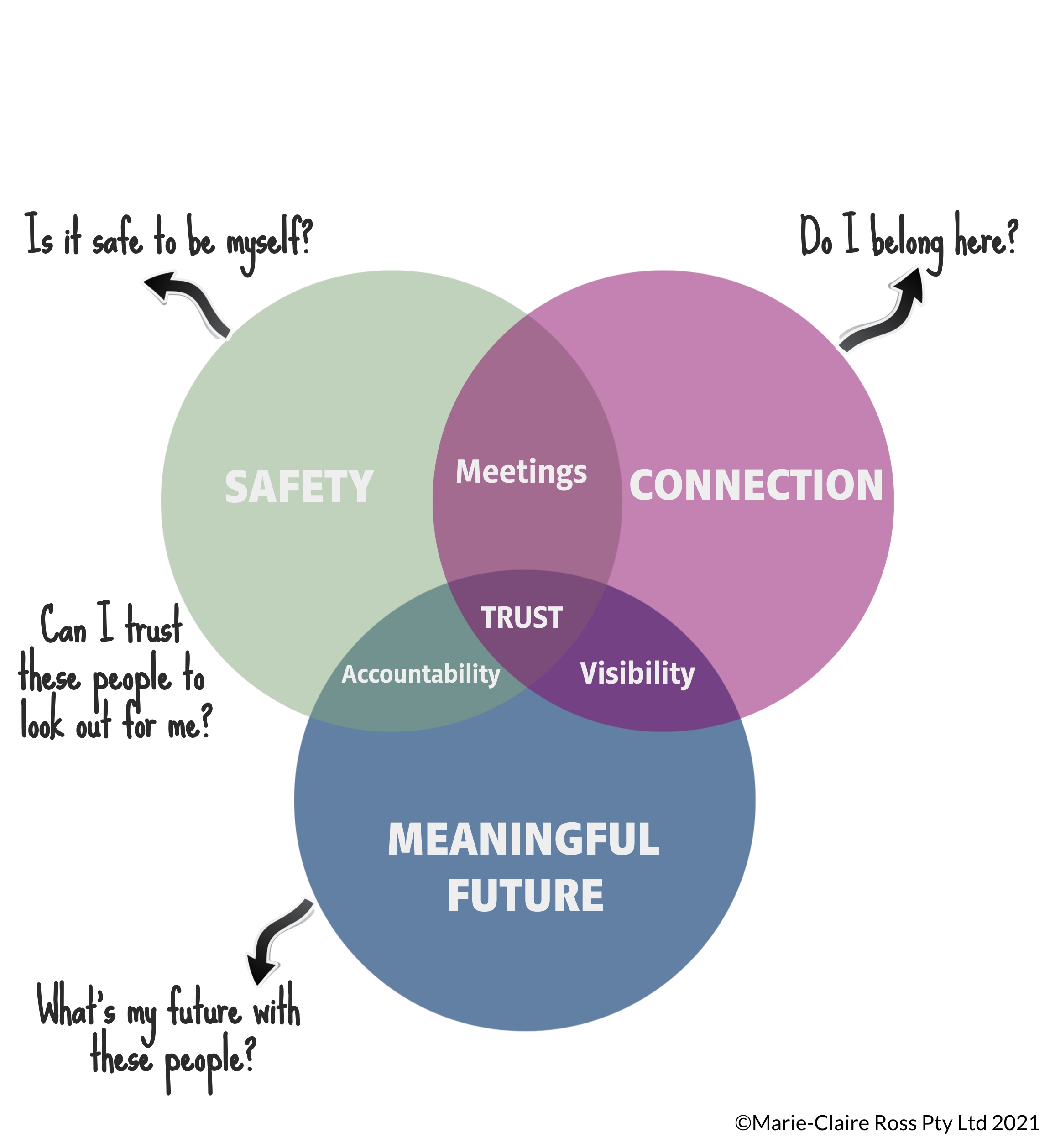11 min read
4 Practical Strategies for Better Emotional Management in the Workplace
I have a friend who often finds herself at the mercy of her emotions. Recently, she called me to rehash a confrontation she’d had with a group of...
Develop leaders, strengthen executive teams and gain deep insights with assessments designed to accelerate trust and performance.

Transform how your leaders think and perform with keynotes that spark connection, trust and high-performance cultures.

Explore practical tools, thought-leadership and resources to help you build trusted, high-performing teams.

Trustologie® is a leadership development consultancy founded by Marie-Claire Ross, specialising in helping executives and managers build high-trust, high-performing teams.

4 min read
Marie-Claire Ross : Updated on January 29, 2026

In the last couple of articles, we have discussed how to move your team out of the anxiety and abatement zones, in order to get them into the Achievement Zone.
In this article, I want to cover what to do if your team is in the apathy zone. This model is taken from the book, Trusted to Thrive (download a free chapter here).
-1.jpg?width=2312&name=Psychological-Safety-and-Accountability%20(1)-1.jpg)
The apathy zone is characterised by a team environment that is low in psychological safety and low in accountability. This can be one of the riskiest teams to work in which results in employees not working too hard and being disengaged. Either because they are afraid of doing the wrong thing or they are too exhausted and burnt out.
In this team, there's a lot of blame going on, cynicism, disdain towards leadership and gossip.
It can often be the result of authoritative, emotionally volatile leaders that are closed off to their direct reports and who unwittingly create a psychologically unsafe team culture. In other words, leaders who prefer to do the technical work rather than managing people. It can also occur in an organisation that had a poorly planned merger or there has been some toxic behaviours played out at the top. This zone is incredibly low in trust and high in turnover.
People also fall into this zone when they are looking for another job or have found it. Their heart is no longer into the work that they do.
This is probably one of the hardest zones to move people out of - either because they are entrenched in their ways or they have been deeply scarred from poor leadership practices.
Interestingly, even when new leadership takes over, people can still act as if they are reliving the past and that they are not truly valued within the organisation.
You will often find a high-performing leader is given this type of team to turn around. The key word to help this team is to empower people. But it's a slow process and requires building trust with each team member that demonstrates that you've got their back. This is important because usually the group identity is that "I can't trust my boss/the system." Dissolving this mindset requires working with each team member individually.
So with that in mind, let's go through the steps to do that:
In this zone, people feel disrespected and that things aren't going to change. Usually at this level, what brings team members together is a sense that they're misunderstood and disconnected from the rest of the organisation. It's been a while since anyone took any interest in them.
Break through this mindset to demonstrate that each individual is valued - for their contribution and insights. Start introducing regular one-on-ones that thank people and acknowledge them for things they have done right. Ask the question - "what would you do if you had my job?" - to demonstrate that you are interested in their opinion. Then, follow up with the right action if necessary (or explain why you couldn't make a change).
A common issue in organisations is that some teams do work that executives don't quite understand. So the result is they might be overworked, using outdated systems that never get improved or they are given unrealistic metrics or expectations.
Typically, in this zone team members are often ignored by senior leadership leading to an increased sense of alienation. When members of senior leadership actually sit beside teams in the apathy zone, and show interest in what they do, it goes a long way to demonstrating that people are valued and understood. It also demonstrates empathy, which most people in this zone, really want.
One-on-ones are a really important technique to use in this zone. Use them to encourage people to start planning out goals and listen to their career aspirations. Then, work with them to create a career plan. Do what you can to organise training to help them reach their goals and prove that you are a true ally. But start small with goals. In this zone, employees are quite shell-shocked and need encouragement to push themselves out of their despondency.
A great technique to use was mentioned in the book, Tribal Leadership, by Dave Logan. This is where you buddy up people in this zone, with someone who is more accountable - so in either the anxiety or achievement zone. Ideally, this third person is seen to be supportive and someone that they can rely on to do the right thing. Encourage them to work together on projects or spend time with each other, so that those in the apathy zone, can get to experience how other people work together. Encouraging friendships with others helps people in this zone to feel more connected and valued within the organisation.
Usually people in this zone have lost confidence in their abilities. Boost morale with small, easy projects that require little management on your part. When they have done the task successfully, thank them and provide verbal recognition publicly. Make them feel proud of their achievement.
It has probably been a long time since employees in this zone have been told how their work truly helps others. Help team members connect to the impact and the meaning behind the work that they do.
The Energy Project surveyed more than 12,000 employees across a range of companies and industries. They found a direct correlation between finding meaning in work and high performance.
Employees who claimed to derive meaning from their work were reportedly 1.4 times more engaged at work, 1.7 times more likely to feel job satisfaction, and three times more likely to stay with their company. Unfortunately, only 50% of employees experienced a sense of meaning in their work.
A powerful leadership skill is to help employees understand the meaning of their role and how it contributes to the success of the organisation. When employees understand their overall role in the business 91% will work towards that success, but the number plummets to 23% if they don’t (Bill Quirke, Melcrum). Connect people to how their work helps customers, their colleagues, and even yourself.
Transitioning people out of the apathy zone, takes time and commitment. It is not a quick process. Teams in this zone really need an emotionally intelligent leader who can sensitively demonstrate that they matter. That they are no powerless and that they can trust themselves and others.
What steps have you taken to get people out of the apathy zone?

11 min read
I have a friend who often finds herself at the mercy of her emotions. Recently, she called me to rehash a confrontation she’d had with a group of...

9 min read
True leadership presence isn’t a performance or a set of charisma hacks; it is the felt experience of who you are being in the room. By cultivating...

13 min read
As teams return from their summer (or winter) break, you may notice subtle shifts in your team’s energy. Even if the end of year was positive, a new...

Leading a high performance team is a bit like a team leader taking their team on an exhilarating elevator ride to the 100th floor of a building.

Every single moment our brains are scanning our environment and calculating whether we can trust the people around us. At work, we need to feel...
-1.jpg)
If we want to lead our teams into the achievement zone, we need to lead ourselves there first.